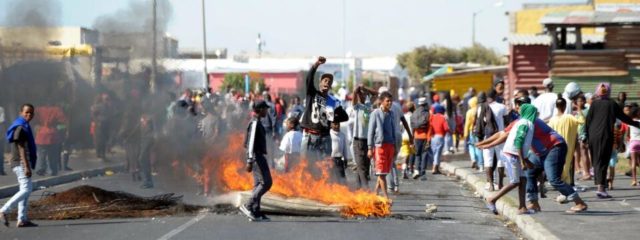Public tolerance has deteriorated with each new scandal, lockdown regulation or service delivery issue resulting in citizens taking to the streets in protest.
CORRUPTION watchdogs and various research institutions believe faith in the government has deteriorated amid tender scandals, looted state coffers and a lack of accountability.
Last week, the Cabinet formed a ministerial task team to compile lists of Covid-19 personal protective equipment (PPE) contracts in response to the outcry over top officials, public elected representatives or leaders who scored Covid-19 tenders.
From allegations that the sons of ANC secretary-general Ace Magashule were awarded contracts worth R2.7 million by the Free State provincial treasury, to the husband of presidential spokesperson Khusela Diko, Chief Madzikane II Diko, being awarded a R125 million PPE tender, the lack of convictions or transparency with ongoing investigations has also served as a slap in the face for citizens, they said.
Organisation Undoing Tax Abuse (Outa) chief executive Wayne Duvenage said the ruling party’s cadre deployment mentality placed the government in the difficult position of either going with or against party patronage decisions.
“Corruption has been rife for ages and there’s been a loud outcry for authorities to be tougher on perpetrators. It feels as though you are hearing and reading more about the government’s intention to crack down on corruption, but where are the results?
“The government doesn’t release status reports or the outcomes of investigations, so we just don’t know how big this problem is.”
Duvenage said public outcry was understood and justified.
“We are in the dark and sadly the poorest suffer the most as tax expenditure doesn’t trickle down. Too much is lost to the system and stays trapped by the cabal at the top. It all plays out as evidenced from schools with pit latrines, to declining water and electricity delivery to communities. But now critical resources meant to fight Covid-19 are being syphoned and it is deplorable.”
David Lewis, executive director of Corruption Watch, said trust was always heavily damaged by corruption.
“When trust is broken it is difficult to repair and everything is taken with scepticism. Every government appointment or new initiative is met with ‘but how are they benefiting?’
“It is difficult to believe that government trust could have worsened after the last administration but it has and that is because of the nature of the victim and this corruption is occurring during a pandemic.”
Public tolerance has deteriorated with each new scandal, lockdown regulation or service delivery issues resulting in citizens taking to the streets in protest.
This was evident in the Institute for Security Studies (ISS) released findings showing a spike in protests since the Covid-19 lockdown began, and that this should serve as a warning sign for the country’s government.
Lizette Lancaster co-authored the body of work with Godfrey Mulaudzi which found that last month an average of eight protests occurred per day, the highest in a single month since 2013. Lancaster is the manager of the crime and justice information hub at the ISS and began studying protest action in 2013.
“People remember what worked during colonial and apartheid times and that was protesting. Many are giving up on democracy but not on voicing their frustration through protests, the 2019 national elections witnessed the lowest turn-out in any election since 1994,” she said.
Lancaster said during the lockdown period of March 27 to July 31, a total of 511 protests were recorded but a worrying trend was how they increased over the past months.
“From March 1 to 26, before the lockdown, there were 42 but between March 27 and April 30, during the strictest lockdown phase, 59 protests occurred, an average of two daily.
“The lockdown was relaxed and in June 169 were recorded with an average of six daily. During July, 232 demonstrations took place, an average of eight a day,” she said.
Lancaster believed people’s patience had almost run out as trust continued to erode.
“It feels one-sided like citizens are making all of the sacrifices leading to a case of the people versus the political elite.”
On Thursday, a webinar hosted by the Institute for Justice and Reconciliation presented insights from Afrobarometer and the South African Reconciliation Barometer (Sarb) on the state of the country’s democracy.
Afrobarometer’s project leader Dominique Dryding said data from 2016 to 2018 found that South Africa came 29 out of 34 African countries with only 54% of participants being in favour of democracy.
“The country was entering a democratic recession well before Covid-19 but the pandemic exacerbated economic problems, curtailed parliamentary processes, hindered civil-society organising, highlighted police and military abuses and more public sector corruption.
“Dissatisfaction with the system’s delivery of both political and economic goods could be contributing to democratic disillusionment.”
Mikhail Moosa, Sarb project leader, said survey data collected between 2015 and last year found that citizens believed there was a trust deficit between them and political leaders.
“They felt that once leaders were elected to Parliament they lost touch with the people and that they didn’t care what the public thought.”








